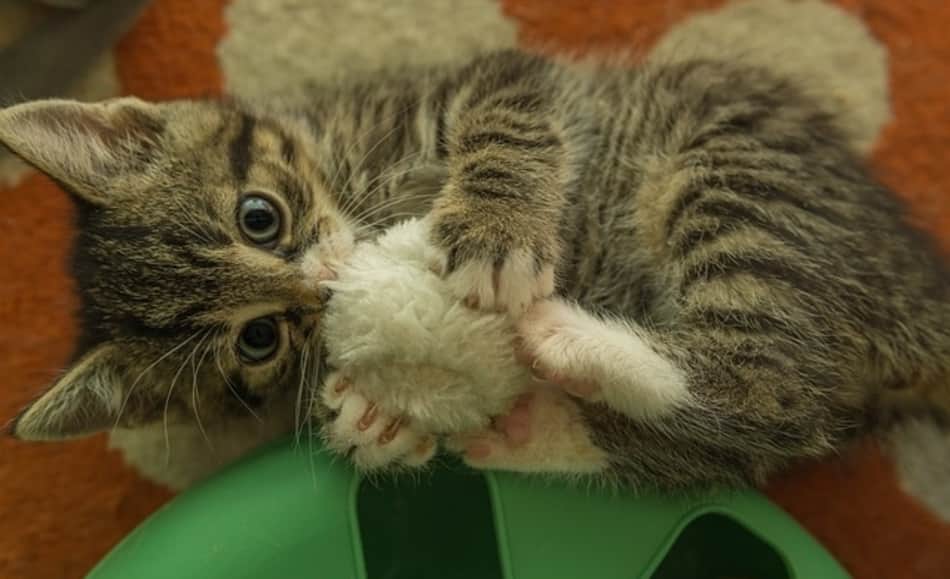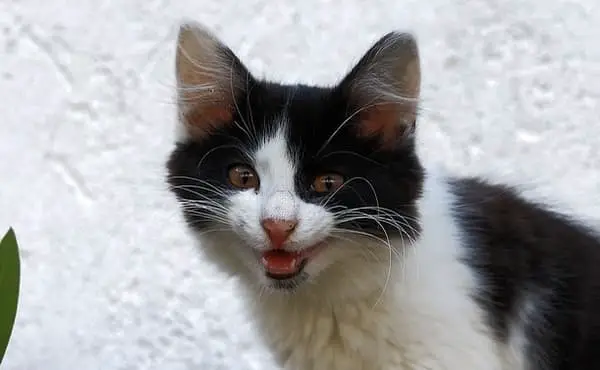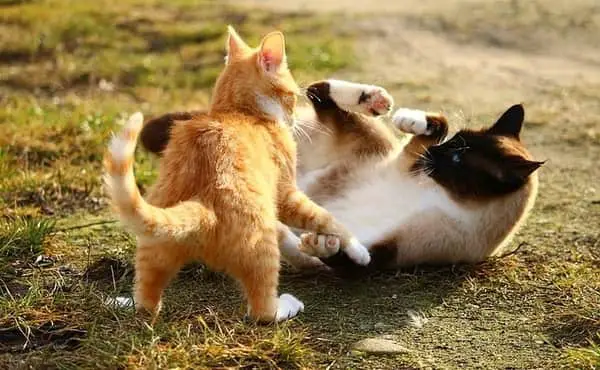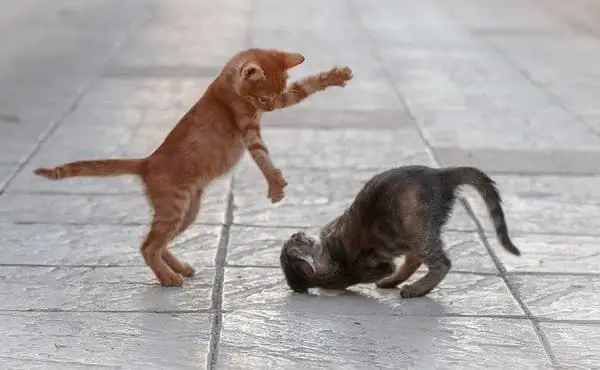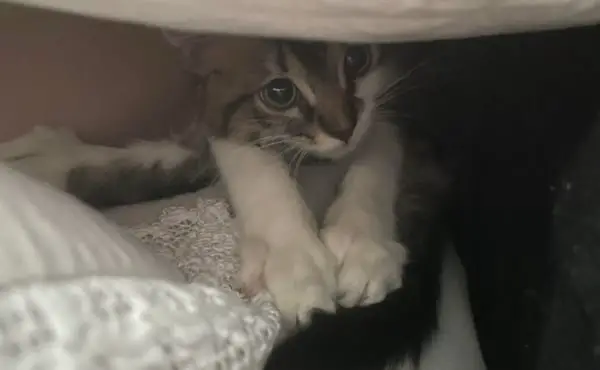Have you ever been playing with your cute little ball-of-fluff kitten only to have it suddenly turn tiger on you? Despite their small size, kittens can play fiercely and will often do their best to be intimidating, relying on behaviors like hissing, swatting, and growling.
So, why does my kitten growl when playing? Growling is usually a cat’s way of expressing either displeasure or aggression. Your kitten may be saying it’s done playing or it may be claiming a toy as its prey. A kitten may also growl if it is frightened, hurt, or angry.
In this article, we’ll explore the nuances of kitten communication via the growl and offer tips on how to understand what your kitten is trying so ferociously to tell you. We’ll also include tips on how to deescalate playtime if your kitten is truly upset and how to curb overly aggressive play.
Recognizing the Growl
Kittens are well-known for a wide variety of vocalizations. There’s the standard meow, of course, but then there’s the mew, the yowl, the whine, the hiss, the snarl, the growl, and a whole array of sounds that fall somewhere in between.
In this article, we’ll be focusing on the vocalization that is most unmistakably growly. It sounds similar to a dog’s growl and often comes from deep in your kitten’s throat.
The Context of Growling
The growl most often comes out during playtime because kittens can get a little carried away when it comes to hunting, pouncing, and trouncing. This is also the time when their reactions toward you, other pets, or objects being played with is likely to be most intense.
A kitten may growl while wrestling with a playmate, grabbing a toy, pacing about the room, or upon being picked up, touched, or approached.
Is it as Dangerous as it Sounds?
Whether or not a growl will be followed by an all-out attack depends on how upset your kitten is and what kind of emotion is behind its growl. If a kitten is truly riled, angry, or feels the need to defend itself, a growl may be followed by hissing and spitting, an arched back, or a clawed swat.
Your kitten may stiffen or back away while displaying its teeth and claws. Your ability to read your kitten, as well as your understanding of its moods, will be important in determining how to respond to its growling.
Why is My Kitten Growling While Playing With a Toy?
If your kitten growls when playing, it might be expressing excitement, possessiveness, or a natural instinct to simulate hunting behavior. Growling during play is not uncommon in kittens and can be a manifestation of their predatory instincts.
It’s essential to observe the overall body language to ensure the growling is playful and not a sign of distress. In many cases, it’s a normal part of a kitten’s playful behavior, reflecting their energetic and enthusiastic nature during playtime.
Reasons for Kitten Growling
As with most other animals, a kitten’s growl is intended to be a warning. It is usually a communication that your kitten feels upset or powerful and wants you to back off. In order to know exactly what is causing your kitten to feel this way and how to deal with it, you’ll need to delve more into body language and circumstances.
Possessive Growling
One of the most common reasons kittens growl when they’re playing is that they are being possessive. They may consider a toy to be their prey. Once they have conquered it, their instinct is to protect it from any challengers. The growling while mouthing a toy may even be unconscious—your kitten simply wants everyone to know that the toy is their catch.
Territorial Growling
Similarly, a kitten may growl to indicate that a certain place is their territory. It may use this vocalization to warn other pets or people away from a cat tree, couch, or some other area it believes to be its own.
Annoyed Growling
A kitten also may growl if it is annoyed. It may be trying to indicate that it does not want to continue playing or dislikes the game being played. This growl may be directed at you or another pet, and its meaning is simple—back off and stop whatever you are doing.
Kittens will often growl if they are tired or want to be put down, you or another pet are playing too roughly, or if you touch a sensitive area of their body like their stomach. An annoyed or riled kitten may also growl to tell you or another pet that it is not interested in interacting.
Dominant Growling
A growl may also be used when kittens are playing to establish dominance. If two kittens are playing and the one on top lets out a growl, it’s basically saying, “I win.” If the kitten on the bottom is growling, it may be more a sign of annoyance or frustration.
A kitten may also try to use this dominance growl on you. We’ll discuss ways to deal with overly dominant or aggressive kittens in a later section.
Angry Growling
Annoyance can develop into full-blown anger if warning growls are not heeded. A cat that is downright angry may add a whining yowl to its growl or follow it up with hissing and spitting. At this point, it may be too late to dodge a scratch or bite, but again, the message is the same: the kitten is asking you to back off and leave it alone.
Fearful Growling
A kitten may also growl if it is frightened or confused. It may do this in a new place or around unfamiliar people or animals. Sometimes a kitten may even growl if they are struggling to recognize someone familiar—if that person or pet has been away, for example, or smells like another place.
If a kitten is frightened, it’s best to discontinue playing with it and give it a chance to settle down. If a specific person, pet, or situation is causing your kitten fear, it’s best to remove the cause or give your kitten a place to retreat until it is more comfortable.
Aggressive Growling
If play gets especially rowdy, a kitten may become overly aggressive. Aggressive growling may be accompanied by pouncing, scratching, and/or biting. Play that leads to a kitten becoming aggressive is too rough and should be toned down.
Some kittens are naturally more aggressive than others, and you will need to take care not to set them off during playtime—something we’ll discuss in more depth later.
Pained Growling
Growling can occasionally be a reaction to pain. If a kitten growls when you touch a certain area and perhaps flinches away, it could be in pain there. A kitten in pain also may growl if you try to pick it up or pet it.
If this is unusual for your kitten or it has no other reason to be upset, you may wish to get it checked out by a vet. You can also look for other symptoms of pain, including the following.
- Hunched posture or change in gait
- Hiding, avoiding contact
- Reluctance to move
- Rapid breathing
- Sudden behavioral changes
- Limping
- Licking the same area of the body frequently
How to Respond to a Growling Kitten
Some kittens are much more dramatic and vocal than others. You will have to learn by interacting with your cat exactly what its growling signifies. Is it a precursor to pouncing or scratching or is it just a mild signification of annoyance? The better you know your kitten, the better prepared you will be to respond appropriately, but there are a few rules of thumb to follow.
Don’t Touch
In most cases, it’s best to simply back off and let a growling kitten alone. This is usually exactly what it’s asking you to do. Avoid moving it, touching it, or gesturing broadly as all of these could be perceived as aggression, leading your kitten to retaliate more physically. Don’t scold or punish a kitten for growling, as this will most likely make matters worse.
Offer Security
If your kitten is growling because it is frightened or overwhelmed, again it’s best to back off. Cuddling or holding your kitten at this point could simply intensify the fear. Allow it some distance from whatever is causing its fear and give it time to just observe and relax.
Discourage Aggression
If your kitten is constantly getting overexcited during playtime and behaving aggressively toward you or another pet, it’s important to deescalate as quickly as possible. Aggressive behavior may involve not only growling but also hissing or spitting and striking out with claws. Other signs of aggression include:
- flattened ears
- an arched back
- stiff legs or tail
- teeth and claws on display
One way to discourage excessive aggression is to stop playing as soon as your kitten begins to behave aggressively.
You can also redirect your kitten’s attention to a toy, even tossing the toy across the room to take yourself entirely out of the equation. Do not roughhouse with a kitten prone to aggression. Instead, keep your interactions calm and redirect its pouncing tendencies toward its toys.
Conclusion
A kitten that growls during playtime may be taking the game a bit too seriously. It’s also possible that your kitten is annoyed at what is going on or tired of playing. The more you interact with your kitten, the more easily you will be able to tell when it is truly upset, but in most cases, the best way to respond to a growl is to back off and give your kitten space.

